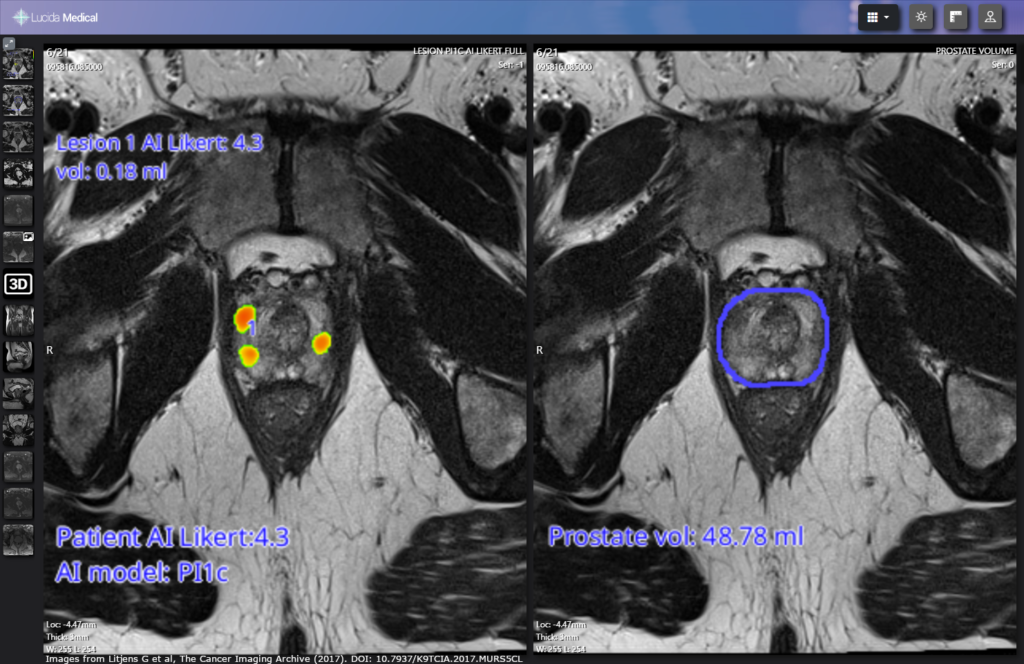Prostate Cancer Diagnosis Just Got Easier with CE Mark Certification of Lucida Medical’s New AI Software

Groundbreaking software by Lucida Medical, Pi, demonstrates expert level of performance and exceptional promise of improving accuracy, cost, and time required in prostate cancer diagnosis
• Prostate cancer is the most common cancer in men with 375,000 annual deaths
• Pi software improves the 12% “miss rate” of MRI in prostate cancer diagnosis, helping ensure patients get the treatment they need
• The software can also reduce the 55% of patients without significant cancer who are referred for costly, painful and potentially avoidable biopsy
• With an integrated, automated workflow and risk scores, the software speeds up analysis, helping hospitals tackle resourcing challenges and waiting times while giving patients the best possible outcome.
CAMBRIDGE, UK (23 Oct 2023) – Lucida Medical Ltd, a Cambridge-based start-up company dedicated to improving cancer diagnosis, has announced it has received Class IIb CE certification for its AI-based prostate cancer detection software, Prostate Intelligence (Pi). Built in partnership with leading clinicians and UK NHS hospitals, the CE mark means the software can now benefit patients across the UK and European healthcare systems.
While MRI is the preferred imaging technique to assess a range of cancers, including prostate cancer and metastatic disease, in the UK alone, radiologist numbers are forecasted to reach a shortfall of 40% by 2027, indicating an urgent need for a streamlined, simplified, and accurate means for cancer diagnosis.
A key clinical study showed that radiologists can miss 12% of significant prostate cancers using MRI, and refer 55% of individuals without significant cancer for a painful and costly biopsy. Data presented at the European Society for Urogenital Radiology (ESUR) in September 2023 indicated that Pi could help cut undetected cancers to 6% while also reducing avoidable biopsies to 43%.
Using AI, Pi analyses the MRI and is fully integrated into the radiologist’s workflow, targeting key issues of variability, radiologist time, and diagnostic accuracy in prostate cancer. Specifically, Pi is intended to be used by radiologists to assess and report prostate MRI studies, by automatically producing 3D segmentations, volumes and risk scores. Its outputs can be used to save radiologists time and support biopsy and treatment decisions.
As the most common cancer in men, each year, prostate cancer gains 1.4 million diagnoses and claims 375,000 lives. In the US alone, 288,000 are diagnosed and 35,000 die. There is great need and potential to improve its diagnosis and treatment, which was shown by recent data from Prostate Cancer UK that highlighted shocking variability across the UK. 35% of men in Scotland with prostate cancer are diagnosed late at stage 4, which leads to debilitating treatment and less than 50% surviving 5 years. This compares with 12.5% diagnosed at stage 4 in London. Earlier detection can help reduce rates of advanced and metastatic disease and in turn greatly improve patients’ experience, outcomes, and life expectancy.
“We desperately need to cut waiting times, detect cancer early, and provide patients and clinicians with all the information needed to for optimum treatment,” explained Co-Founder and Chief Medical Officer Professor Evis Sala, Chair of Radiology at the Università Cattolica del Sacro Cuore and Director of the Advanced Radiology Centre at the Policlinico Universitario A. Gemelli, IRCCS. “With this CE mark, the results of our investment in AI and clinical research over the last 4 years can now be used by doctors to provide the best possible diagnosis for men with suspected prostate cancer.”
“This CE certification establishes Pi as the leading platform to support prostate cancer diagnosis with MRI, from screening patients at elevated risk, to biopsy, diagnosis and treatment planning,” continues Dr. Antony Rix, CEO and Co-Founder. “As the only AI solution for prostate MRI that integrates automatically with radiologists’ workflows and that has unprecedented accuracy in real-world validation, Pi has enormous potential to improve patients’ outcomes and reduce costs and waiting lists in health systems like the NHS.”
Lucida Medical will demonstrate Pi at the Radiological Society of North America (RSNA) 2023 Annual Meeting from 26-29 November, where the results of the latest external validation of the software will be presented in scientific session S1-SSGU01 by Dr. Francesco Giganti, Associate Professor of Radiology at University College London.
The company plans to make Pi commercially available in the UK and EU in Q1, 2024. Pi is not for sale in the US.
About Lucida Medical
Lucida Medical develops AI-based technology to assist clinicians to find cancer more accurately, diagnose and treat it more effectively, and save time. A start-up business from the University of Cambridge, Lucida Medical was founded in 2019 by Dr. Antony Rix, an expert in medical devices, machine learning and AI, and Prof. Evis Sala, who at the time was Professor of Oncological Imaging at the University of Cambridge & Addenbrooke’s Hospital, and who is now Chair of Radiology at the Università Cattolica del Sacro Cuore and Director of the Advanced Radiology Centre at the Policlinico Universitario A. Gemelli, IRCCS in Rome. Prostate Intelligence (Pi) is intended for use to assist the diagnosis of prostate cancer, and is the company’s first product to complete regulatory approvals.
Lucida Medical is backed by investors including XTX Ventures, Prostate Cancer Research, and leading radiologists and urologists. Following a successful collaboration with GE HealthCare in 2021, the company is now piloting the software in the UK, Germany and Italy, and building partnerships with hospitals and leading vendors to make Pi available across Europe.




